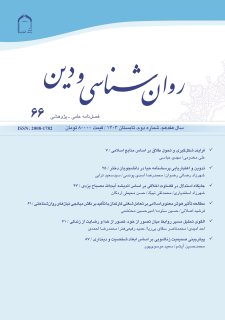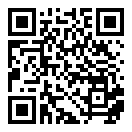نویسندگان:
حسین ستوده / استادیار گروه مدیریت دولتی، دانشگاه پیام نور، تهران.
صفحهها:
61-70
تاریخ دریافت: 1401/11/05
تاریخ پذیرش: 1402/03/13
چکیده:
با غالب شدن فضای فکری پسانوگرایی (پست مدرنیسم) بر جوامع، انسان بیش از پیش احساس پوچی و بیهویتی میکند. ازاینرو وجود معنویت در محیط کاری منجر به تقویت انگیزش و امید کارکنان میشود. این مفهوم در جوامع اسلامی به سبب بافت فرهنگی و دینی در قالب «هوش معنوی اسلامی» معرفی شده است. هدف پژوهش حاضر مطالعه تأثیر هوش معنوی اسلامی بر تعامل شغلی کارکنان با تأکید بر نقش میانجی نیازهای روانشناختی بوده است. جامعه آماری این پژوهش شامل کارمندان منطقه 20 شهرداری تهران به تعداد 500 تن بودند که تعداد 217 تن با روش «تصادفی ساده» انتخاب شدند. در تحقیق حاضر برای جمعآوری اطلاعات از پرسشنامه «تعامل شغلی» لیدن و ماسلین (1998)، «هوش معنوی» کینگ (2007) و «نیازهای اساسی روانشناختی» گاردیا، دسی و رایان (2000) استفاده شده است. برای تجزیه و تحلیل دادههای گردآوری شده روش «معادلات ساختاری» به کار گرفته شده است. نتایج نشان داد نقش میانجی نیازهای روانشناختی بین هوش معنوی اسلامی و تعامل شغلی معنادار است.
Article data in English (انگلیسی)
Title:
Studying the Effect of Islamic Spiritual Intelligence on the Employees' Job Interaction With an Emphasis on the Mediating Role of Psychological Needs
Abstract:
With the predominance of the idea of postmodernism over societies, people feel more empty and feel lacking a sense of identity. Therefore, the existence of spirituality in the work environment leads to strengthening the motivation and hope of employees. This concept is introduced in the form of "Islamic spiritual intelligence" in Islamic societies due to its cultural and religious context. The purpose of this research is to study the effect of Islamic spiritual intelligence on the job interaction of employees, emphasizing the mediating role of psychological needs. The statistical population of this research includes 500 employees of the 20th district of Tehran municipality, 217 of which were selected by "simple random" method. To collect the data, the "Job Interaction" questionnaire by Leyden and Maslin (1998), "Spiritual Intelligence" by King (2007) and "Basic Psychological Needs" by Guardia, Desi and Ryan (2000) are used in this research. To analyze the collected data, "Structural equations" method is used. According to the results, the mediating role of psychological needs between Islamic spiritual intelligence and job interaction is significant.
References:
- ارشدی، نسرین، 1387، طراحی و آزمون الگوی ارزشیابیها و پیامدهای مهم انگیزش شغلی در کارکنان شرکت ملی مناطق نفتخیز جنوب منطقة اهواز، رساله دکتری روانشناسی، اهواز، دانشکده روانشناسی و علوم تربیتی، دانشگاه شهید چمران اهواز.
- اسدزاده هیر، نجف و همکاران، 1398، «بررسی رابطه بین هوش معنوی و مؤلفههای آن با عملکرد شغلی معلمان شهرستان اصلان دوز»، روانشناسی مدرسه، ش8، ص7-21.
- تفته، مرضیه، (1397)، «رابطه هوش معنوی و ادارک از جو سازمانی با سرمایه فکری کارکنان دانشگاه آزاد اسلامی واحد مرودشت»، رهیافتی نو در مدیریت آموزشی، ش9 (34)، ص129-150.
- رستمینسب دولتآباد، زینب و همکاران، 1397، «بررسی اثربخشی رواندرمانی معنوی - مذهبی بر افسردگی، ارضای نیازهای بنیادین روانشناختی و رضایت از زندگی در مبتلایان به اچ.آی.وی مثبت»، پژوهش در دین و سلامت، ش4، ص7-20.
- زرنگاریان، یوسف و جواد عزیزی، (1398)، «تأثیر هوش معنوی اسلامی و اخلاق کار اسلامی بر تعهد سازمانی و قصد ترک شغل کارکنان (مطالعه موردی: سازمان فرهنگ و ارشاد اسلامی»، مدیریت اسلامی، ش27 (2)، ص147-125.
- صالحی، مهدی و همکاران، 1396، «بررسی تأثیر هوش معنوی و هوش هیجانی مدیران بر عملکرد مالی شرکتها»، حسابداری سلامت، ش6، ص68-87.
- کوکبی، محمد، 1400، بررسی تأثیر بازاریابی داخلی بر تعامل کاری و قصد ترک شغل (مورد مطالعه: شعب بانک اقتصاد نوین در استان تهران)، پایاننامه کارشناسی ارشد دانشگاه پیام نور استان مازندران، مرکز پیام نور بابل.
- مرامی، مهناز و همکاران، 1398، «مقایسه اثربخشی برنامههای آموزش هوش معنوی و تاب آوری بر توانمندسازی روانشناختی کارکنان»، روانشناسی مثبت، ش5، ص51-62.
- وارث، پیرحامد و همکاران، 1388، «رابطه ارتباط فرافردی و رفتار شهروندی»، مدیریت دولتی، ش1، ص135-154.
- Amram, Y. & Alto, P, 2007, "The Seven Dimensions of Spiritual Intelligence", Presented at the 115th Annual Conference of the American Psychological Association, San Fransisco, USA.
- Athar, M. R., Shahzad, K., Ahmad, J., & Ijaz, M. S, 2016, "Impact of Islamic work ethics on organizational commitment: Mediating role of job satisfaction", Journal of Islamic business and management, No 6(1), p. 119-134.
- Bickerton, G.R, 2013, Spiritual resources as antecedents of work engagement among Australian religious workers. Thesis (PhD). University of Western Sydney.
- Carmeli, A., Friedman, Y., & Tishler, A, 2013, "Cutivating a Resilience Top Management Team: The Importance of Relational Connections and Strategic Decision Comprehensiveness", Journal of Safety Science, No. 51, p. 148-159.
- Durrani, F, 2017, "Mediating role of organizational justice in relationship between Islamic work ethics and employee turnover intention", Pakistan Journal of Commerce and Social Sciences (PJCSS), No. 11(3), p. 1050-1068.
- Ghorbani, N., Watson, P.J, 2004, "Two facets of self-knowledge, big five؛ and promotion among Iranian managers", Journal of social behavior and personality: An International Journal, No. 6(8), p. 769-777.
- Guardia, G.J., Deci, E.L., Ryan, R.M, 2000, "Withinperson variation in security of attachment: A self- theory perspective on attachment, Need Fulfillment and wellbeing", Journal of personality and social psychology, No. 79(8), p. 367-384.
- Hanefar, S. B., Siraj, S., & Sa’ari, C. Z, 2015, "The Application of Content Analysis toward the Development of Spiritual Intelligence Model for Human Excellence (SIMHE)", Procedia-Social and Behavioral Sciences, No. 172, p. 603-610.
- Heyns MM, McCallaghan S, de Wet EH, 2022, "The role of supervisor support and basic psychological needs in predicting work engagement, burnout and turnover intentions in a medical contract research service setting", Res Social Adm Pharm, no, 18(6). p. 2981-2988.
- Joe Sanjay, I, 2021, "The Impact of of Spiritual and Emotional Intelligences in Employee Engagement and Organizational Citizenship Behavior", Int.J. of Aquatic Science, No. 12(2), p. 637-649.
- King, D. B, 2007, The Spiritual Intelligence Project, Trent University, Canada. Available from: www.dbking.net.
- King, D.B., & DeCicco, T.L, 2009, "A viable model and self-report measure of spiritual intelligence", International Journal of Transpersonal Studies, No. 28, p. 68-85.
- Koenig HG, McCullough ME, Larson DB, 2004, Handbook of religion and health, 1nd ed, Oxford: Oxford University Press, USA.
- Lartey F, M., &. Randall ,Ph, M, 2021, Published by Canadian Center of Science and Education 99 From the Balanced Measure of Psychological Needs (BMPN) to Employee Engagement, Indicators that Matter International Business Research, No. 14(6), p. 1913-9012.
- Liden RC, Maslyn JM, 1998, "Multidimensionality of leader-member exchange: an empirical assessment through scale development", Journal of Management. No. 24(1), p.43-72.
- Loi, R., Chan, K. W., & Lam, L. W, 2014, "Leader–Member Exchange, Organizational Identification, and Job Satisfaction: A Social Identity Perspective", Journal of Occupational and Organizational Psychology, No. 87(1), p. 42–61.
- Ryan, R. M., & Deci, E. L, 2017, Self-determination theory: Basic psychological needs in motivation, development, and wellness, New York: Guilford Publishing.
- Saks, A.M, 2011, "Workplace spirituality and employee engagement", Journal of Management, Spirituality & Religion, No. 8(4), p. 317-340.
شیوه ارجاع به این مقاله:
RIS
Mendeley
BibTeX
APA
MLA
HARVARD
VANCOUVER
APA | MLA | HARVARD | VANCOUVER
اصلانی، فرشید، ستوده، حسین، محتشمی پور، امیر حسین.(1403) مطالعه تأثیر هوش معنوی اسلامی بر تعامل شغلی کارکنان با تأکید بر نقش میانجی نیازهای روانشناختی. فصلنامه روانشناسی و دین، 17(2)، 61-70 https://doi.org/10.22034/ravanshenasi.2024.2021228
APA | MLA | HARVARD | VANCOUVER
فرشید اصلانی؛ حسین ستوده؛ امیر حسین محتشمی پور."مطالعه تأثیر هوش معنوی اسلامی بر تعامل شغلی کارکنان با تأکید بر نقش میانجی نیازهای روانشناختی". فصلنامه روانشناسی و دین، 17، 2، 1403، 61-70
APA | MLA | HARVARD | VANCOUVER
اصلانی، فرشید، ستوده، حسین، محتشمی پور، امیر حسین.(1403) 'مطالعه تأثیر هوش معنوی اسلامی بر تعامل شغلی کارکنان با تأکید بر نقش میانجی نیازهای روانشناختی'، فصلنامه روانشناسی و دین، 17(2), pp. 61-70
APA | MLA | HARVARD | VANCOUVER
اصلانی، فرشید، ستوده، حسین، محتشمی پور، امیر حسین. مطالعه تأثیر هوش معنوی اسلامی بر تعامل شغلی کارکنان با تأکید بر نقش میانجی نیازهای روانشناختی. روانشناسی و دین، 17, 1403؛ 17(2): 61-70







